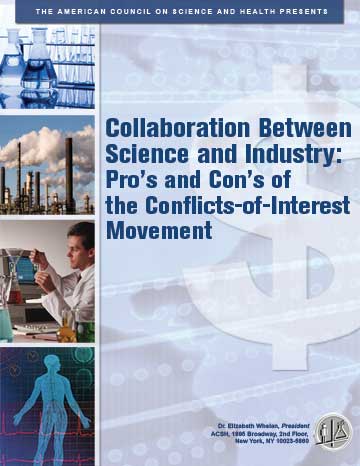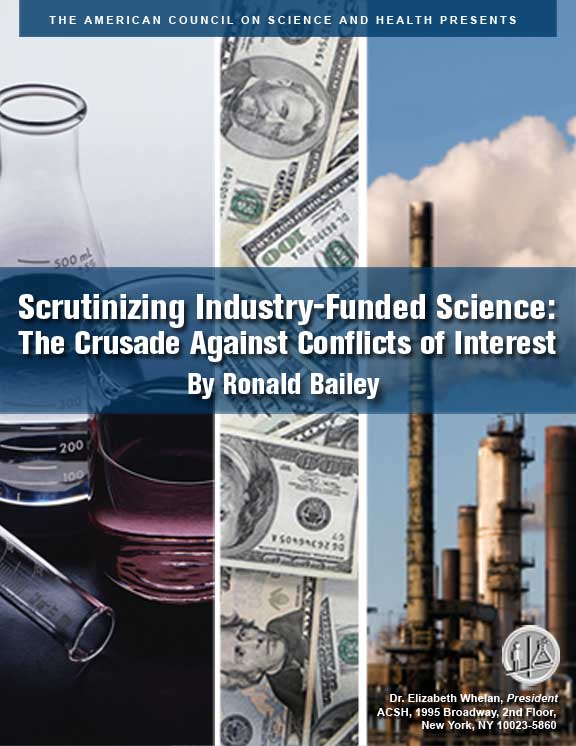A new bill (HR 4167) currently wending its way through Congress has the potential to protect consumers from the current hodgepodge of irrational safety warnings on foods. Under the bill, which has been passed by the House of Representatives, states would need FDA approval for labeling requirements that differ from federal standards. The bill mandates uniform food safety labels nationwide.
Search results
Tony Soprano (of the HBO mega-series The Sopranos) is a mobster whose stock in trade is intimidation and murder. Nick Naylor, a character in the just-released movie Thank You For Smoking (based on Chris Buckley's 1994 novel), peddles the addictive killer, cigarettes. He blithely sells his product to any and all comers -- age is not a factor in his business. Indeed, in a key scene, Naylor asserted that he would buy his own son cigarettes at age eighteen, if the boy so chose.
Sexual behavior has historically carried moral and ideological import, particularly when it comes to young people. But it also raises issues of health and safety. So deciding what kinds of information sexual education courses should include is a notoriously controversial task. One school of thought supports "comprehensive sexual education," which promotes abstinence but also includes information about condoms and other forms of contraception in order to educate young people about how to protect themselves if they become sexually active.
1. Focus your efforts on things that matter.
It is important that we distinguish between risks that are real and can be lessened by individuals' actions and those that are theoretical, very small, or beyond our control.
Six children have been hospitalized with E. coli O157:H7 infections, acquired from drinking unpasteurized (raw) milk. As of this writing, three are reported to still be in the hospital in Oregon -- two in critical condition.
"Those who do not learn from history are doomed to repeat it." While the author of that quote, philosopher George Santayana, probably wasn't talking about the history of public health and food safety, he might well have been.
Perhaps you're health but are told by your doctor, after a routine blood test, that you should take statins to combat high cholesterol. Fine. But then you start wondering what else you should be testing for in your blood. After all, you've been reading about all those toxic chemicals that invade our daily lives -- nasty-sounding things ranging from pesticides and PCBs to heavy metals and flame retardants.
This piece appeared in the National Review Online and the Washington Times.
More darts than laurels should be distributed in 2005 in the fields of public health and health journalism. Here are the year's Top Ten health absurdities:
Last summer, California Attorney General Bill Lockyer moved to "protect" Californians from the supposed threat of acrylamide found in foods. He has brought a suit to force producers of foods such as French fries to put warning labels on their products. May we respectfully suggest that the AG update himself on some scientific research?
A new Archives of Internal Medicine report estimating the prevalence of milder forms of bird flu in Vietnam ("Is Exposure to Sick or Dead Poultry Associated with Flulike Illness?" by Thorson, Petzold, Thi Kim Chuc, and Ekdahl in the Jan. 9, 2006 issue) raises several important questions that have not been widely contemplated before.
Unfortunately for their self-image, the French, like the citizens of virtually every other country, are fighting the battle of the bulge. They can no longer be considered immune to the rising tide of obesity that has been occurring in the U.S. of late, according to an article in the International New York Times.
Fears welcomes aboard cartoonist Marvin Winter, who'll regularly put a thousand words worth of ACSH-related ideas on science and scares into one funny image...

This cartoon may be freely reproduced, so long as Marvin Winter and ACSH.org are credited.
ACSH president Dr. Elizabeth Whelan wrote an article for TechCentralStation.com criticizing attacks on breakfast cereal. That in turn inspired comments from two dentists, below (and remember you can easily add your own comments, to this or any other Fears item, by signing in at the right margin):
Dr. Whelan,
It's no secret that crystal methamphetamine is oozing eastward, into urban areas, and up the socioeconomic ladder. But with all the recent media coverage, one has to wonder...is the meth epidemic something novel, or is it just the same old story with a new drug playing the lead role? Skeptics and critics of the "War on Drugs" point out that as long as demand exists for a drug, law enforcement is practically powerless to prevent its use.
Although it may be appropriate to criticize the revolving-door ethics involved when a former congressman becomes an advocate for an industry with which he had legislative dealings, the issue of government-controlled drug pricing is not a fair target ("Switch raises issues of loyalty," Opinion, Jan. 3). This part of the Medicare drug bill is there for good reason, as witness the current precarious state of our vaccine supply.
Back when Jaws was scaring us on the big screen in the 1970s, Americans were being warned of a more subtle danger. On television and in the papers, we were told that saturated fats, the type found in some meat and dairy products and in some processed foods, were on the verge of causing an epidemic of heart disease.
A five-year-old autistic boy died Tuesday after receiving chelation treatment, a controversial therapy approved only for cases of acute heavy metal poisoning -- but a treatment sought with increasing frequency by parents who think it will help their autistic children. While the cause of death will not be known until after an autopsy, the tragedy is a reminder that doctors providing chelation therapy are acting irresponsibly and in a manner inconsistent with their role as healthcare providers.
A new report in the current Journal of the American Medical Association (JAMA) indicates that vaccinating infants and toddlers against a group of pneumonia-causing bacteria has had the unintended effect of reducing the toll of "invasive pneumococcal disease" (IPD) among older Americans as well ("pneumococcus" is the commonly used name for the bacteria whose infections are prevented by the vaccine, which is called PCV-7; the serious diseases caused by the pneumococcus are pneumonia, bacteremia, and meningitis).
This letter appeared on November 13, 2005:
Alec van Gelder's Oct. 31 op-ed article on issues swirling around preparing for a possible pandemic of bird flu makes some excellent points about the need for public-private cooperation and the disastrous consequences for public health that would likely ensue if patents on antivirals were violated for expediency's sake.
Penn Jillette is not only a magician, comedian, skeptic, libertarian, and radio host -- he's also a big fan of ACSH Trustee Dr. Norman Borlaug, calling him "My biggest hero on the planet" in this recent interview of Borlaug on Penn's radio show:
http://podcast.penn.freefm.com/penn/25352.mp3

 April 2, 2008 -- New York, NY. scientists' ties to indus
April 2, 2008 -- New York, NY. scientists' ties to indus
DISPATCH: Plastic, Longevity, Gender, and Vitamins
The Anti-Quote of the Day: The dangers of plastic bottles"The truthful answer is that nobody knows" their full health impact yet, said David Ozonoff, a professor of environmental health at the Boston University School of Public Health. "And because we don't know, it's prudent to avoid something that is avoidable." --_Boston Globe_, April 23, 2008.
MORNING DISPATCH 8/15/08: Strokes, Risks, Babies, Cancer
Mice develop cancer after being predisposed to itA new study alleges that common skin creams cause tumors in mice -- but only mice bred to be prone to skin cancer that were pre-treated with high levels of UV radiation. "They applied the creams after purposely making the mice susceptible to skin cancer," says ACSH's Dr. Ruth Kava. "So is it the cream or the pretreatment?"
A survey finds, disturbingly, that a majority of primary care physicians feel overworked and that many are planning on either cutting back on the number of patients they see or quitting medicine entirely. "This issue says a lot about our healthcare system," notes ACSH's Dr. Elizabeth Whelan.
A well-controlled, randomized study published in the Journal of the American Medical Association concludes that ginkgo biloba does not actually improve memory or brain function.
"This should be the end of the discussion on ginkgo biloba, but of course it won't be," says ACSH's Dr. Gilbert Ross. "Look at homeopathy. There hasn't been a single study that proves that it works or has any benefit to anyone, and yet billions are spent on it each year."
Twenty years ago tomorrow, a combination of environmentalists, public interest lawyers, publicists, and members of the news media foisted a bogus health scare on the American public -- the fear that apples being sprayed with Alar were exposing children to a cancer-causing chemical.
Pagination
ACSH relies on donors like you. If you enjoy our work, please contribute.
Make your tax-deductible gift today!


